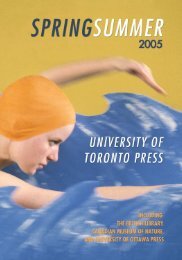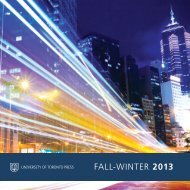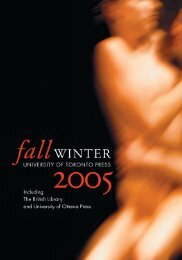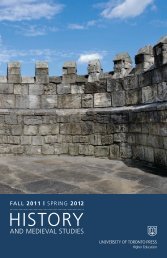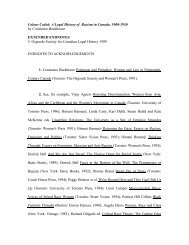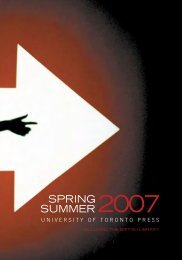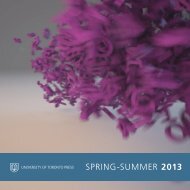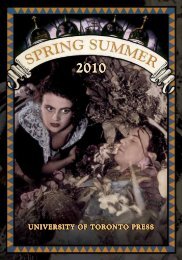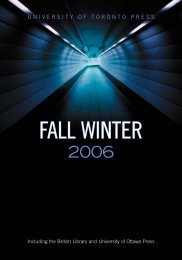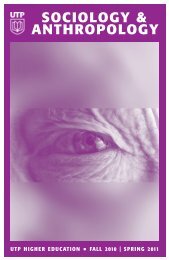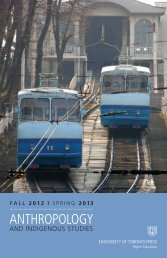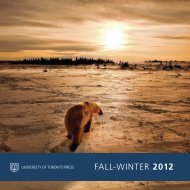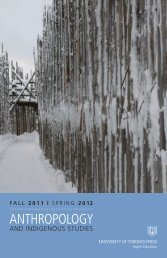Classics, Medieval & Renaissance 2012 - University of Toronto ...
Classics, Medieval & Renaissance 2012 - University of Toronto ...
Classics, Medieval & Renaissance 2012 - University of Toronto ...
Create successful ePaper yourself
Turn your PDF publications into a flip-book with our unique Google optimized e-Paper software.
LITERATURE<br />
The Legacy <strong>of</strong> Apollo<br />
Antiquity, Authority, and Chaucerian Poetics<br />
Jamie C. Fumo<br />
Apollo, the classical god <strong>of</strong> poetry, truth, light, and<br />
the healing arts, held a special fascination for poets<br />
and scholars in the late-medieval period. In The<br />
Legacy <strong>of</strong> Apollo, Jamie C. Fumo presents a series <strong>of</strong><br />
connected readings <strong>of</strong> classical and medieval texts<br />
that shape the god’s pre-modern legacy.<br />
Fumo innovatively brings the fruits <strong>of</strong> current<br />
scholarly practices <strong>of</strong> intertextuality to a body <strong>of</strong><br />
medieval subject matter. This wide-ranging work<br />
traces the resonances <strong>of</strong> Apollo up to the cusp <strong>of</strong><br />
the early modern period and reveals the medieval<br />
development <strong>of</strong> a newly self-conscious poetics <strong>of</strong><br />
inspiration in England.<br />
Jamie C. Fumo is an associate pr<strong>of</strong>essor in the Department<br />
<strong>of</strong> English at McGill <strong>University</strong>.<br />
‘The wonderful breadth <strong>of</strong> Jamie Fumo’s engaging<br />
examination <strong>of</strong> classical forms in the Middle Ages<br />
<strong>of</strong>fers valuable new interpretations <strong>of</strong> Chaucer’s<br />
work and rare insight into medieval tropes <strong>of</strong> narrative<br />
authority.’<br />
Suzanne Yeager, Fordham <strong>University</strong><br />
360 pp / 8 illustrations / 6 x 9 / 2010<br />
Cloth 978-1-4426-4170-9 $70.00 (£48.99)<br />
The Poetics <strong>of</strong> Speech in the <strong>Medieval</strong> Spanish Epic<br />
Matthew Bailey<br />
The Poetics <strong>of</strong> Speech in the <strong>Medieval</strong> Spanish Epic<br />
explores the composition <strong>of</strong> manuscript texts in<br />
thirteenth-century Spain. By analysing expressive<br />
traits found in these three poems, Matthew Bailey<br />
links them to the cognitive processes that take place<br />
in the minds <strong>of</strong> speakers as narration unfolds.<br />
Bailey incorporates the methodologies and concepts<br />
<strong>of</strong> discourse analysis in an examination <strong>of</strong> expression<br />
in the Spanish epic and points convincingly to oral<br />
composition as the initial step in text creation for<br />
the period.<br />
Matthew Bailey is a pr<strong>of</strong>essor in the Department<br />
<strong>of</strong> Romance Languages at Washington and Lee<br />
<strong>University</strong>.<br />
‘Bailey presents a cogent, concise, well-constructed<br />
argument for the importance <strong>of</strong> oral composition in<br />
the medieval Spanish epic … Highly recommended.’<br />
E.H. Friedman, CHOICE<br />
200 pp / 6 x 9 / 2010<br />
Cloth 978-1-4426-4156-3 $45.00 (£31.99)<br />
RENAISSANCE<br />
NEW<br />
Dire Straits<br />
The Perils <strong>of</strong> Writing the English Coastline from Leland to Milton<br />
Elizabeth Jane Bellamy<br />
England became a centrally important maritime<br />
power in the early modern period, and its writers<br />
– acutely aware <strong>of</strong> their inhabiting an island –<br />
<strong>of</strong>ten depicted the coastline as a major topic <strong>of</strong> their<br />
works. However, early modern English versifiers had<br />
to reconcile this reality with the classical tradition, in<br />
which the British Isles were seen as culturally remote<br />
compared to the centrally important Mediterranean<br />
<strong>of</strong> antiquity. This was a struggle for writers not only<br />
because they used the classical tradition to legitimate<br />
their authority, but also because this image dominated<br />
cognitive maps <strong>of</strong> the oceanic world.<br />
As the first study <strong>of</strong> coastlines and early modern<br />
English literature, Dire Straits investigates the tensions<br />
<strong>of</strong> the classical tradition’s isolation <strong>of</strong> the British Isles<br />
from the domain <strong>of</strong> poetry. By illustrating how early<br />
modern English writers created their works in the<br />
context <strong>of</strong> a longstanding cultural inheritance from<br />
antiquity, Elizabeth Jane Bellamy <strong>of</strong>fers a new approach<br />
to the history <strong>of</strong> early modern cartography and its<br />
influences on literature.<br />
Elizabeth Jane Bellamy is a pr<strong>of</strong>essor and John<br />
C. Hodges Chair <strong>of</strong> Excellence in the Department <strong>of</strong><br />
English at the <strong>University</strong> <strong>of</strong> Tennessee.<br />
Approx. 224 pp / 2 illustrations / 6 x 9 / December <strong>2012</strong><br />
Cloth 978-1-4426-4501-1 $55.00 (£38.99)<br />
24 <strong>University</strong> <strong>of</strong> <strong>Toronto</strong> Press



